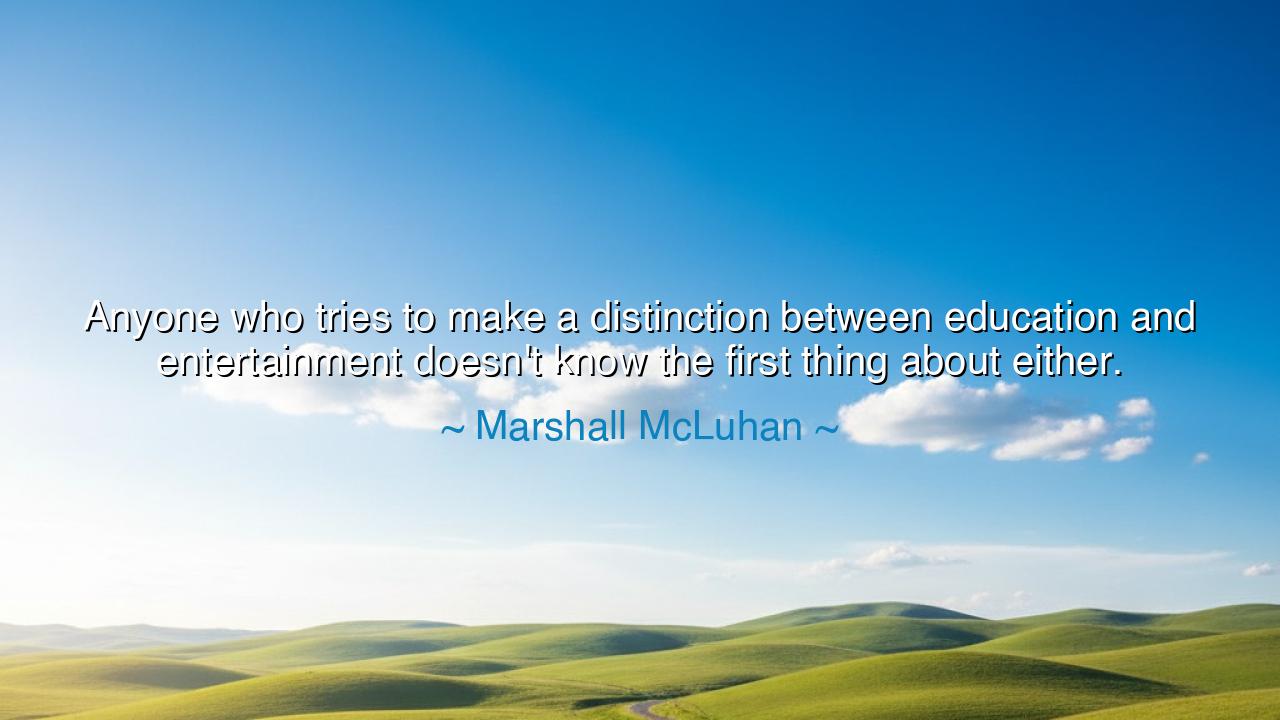
Anyone who tries to make a distinction between education and
Anyone who tries to make a distinction between education and entertainment doesn't know the first thing about either.






In the striking words of Marshall McLuhan, the sage of media and mind, “Anyone who tries to make a distinction between education and entertainment doesn’t know the first thing about either.” At first, these words seem to defy tradition, for through the ages, men have placed education on one lofty pedestal and entertainment upon another, as if they were rivals — the serious and the frivolous, the sacred and the profane. Yet McLuhan, whose wisdom pierced the fabric of modern communication, saw deeper than most. He saw that to teach is to engage, and to engage is to delight — and that the human soul learns best when both mind and heart are stirred together in harmony.
Born in the age when radio and television began to shape the consciousness of mankind, Marshall McLuhan was among the first to understand that every medium — from spoken word to printed book, from screen to stage — carries with it the power to teach, to shape, to transform. He saw that in a world overflowing with information, the boundaries between education and entertainment would blur. For what is entertainment, if not the art of capturing attention? And what is education, if not the art of directing that attention toward truth? Thus, he declared that those who separate the two fail to grasp the living spirit that animates both.
In the ancient world, the great teachers understood this well. The philosopher Socrates did not lecture from a stone throne; he conversed in the streets, stirring laughter and thought alike. The poet Homer taught the Greeks their values not through textbooks, but through tales of heroes and gods, woven with rhythm and fire. Even the wandering sages of the East taught through stories, parables, and songs — blending wisdom with wonder, learning with delight. The ancients knew, as McLuhan reminded the modern age, that education without joy is sterile, and entertainment without truth is hollow. The two are not enemies — they are two wings of the same bird that carries the soul toward understanding.
Consider the story of Walt Disney, who brought this truth to life in the modern era. Through animation, he captured the imagination of millions, young and old alike. Yet beneath the dancing colors and playful songs were timeless lessons — about courage, friendship, justice, and the triumph of hope. The laughter of a child before a Disney film is not just joy; it is the beginning of learning, for it awakens curiosity, empathy, and the sense of wonder that is the first teacher of all. In this way, Disney and McLuhan shared a vision — that education and entertainment, when united, become a force powerful enough to shape the very soul of humanity.
But McLuhan’s words carry a warning as well. In an age where entertainment reigns over all, the danger lies not in joy, but in emptiness — in entertainment stripped of purpose, and education drained of spirit. When teachers become dull, learning dies; when artists forget meaning, beauty fades. To separate the two is to wound them both: the teacher loses his audience, and the entertainer loses his depth. Thus, the wise must seek balance — to weave delight into truth, and truth into delight — for only in that balance can knowledge take root in the heart.
Education, then, must not be a prison of lectures and facts, but a living art that awakens passion. Entertainment, too, must not be a hollow escape, but a vessel for insight and reflection. The one should inspire; the other should enlighten. Together, they form the language of the soul — a universal language that transcends borders and generations. For when learning is joyful, and joy is meaningful, the mind expands as naturally as the dawn spreads its light across the sea.
The lesson, dear listener, is as radiant as it is eternal: do not scorn what delights you, and do not neglect what teaches you. Seek wisdom in the songs, in the stories, in the laughter that moves the heart, for there, hidden in joy, lies understanding. Let teachers become storytellers, and storytellers become teachers. Read not only to know, but to feel; listen not only to be entertained, but to grow. For in the union of education and entertainment lies the most powerful instrument ever given to humankind — the power to transform both the mind and the spirit.
Thus, as Marshall McLuhan proclaimed, the one who divides these twin forces “doesn’t know the first thing about either.” For truth and joy are not strangers; they are eternal companions on the road to enlightenment. To learn with wonder is to become wise; to teach with joy is to become immortal. Let that be the legacy of all who seek to awaken others — to make learning a living fire, and entertainment a light that guides the way.






AAdministratorAdministrator
Welcome, honored guests. Please leave a comment, we will respond soon